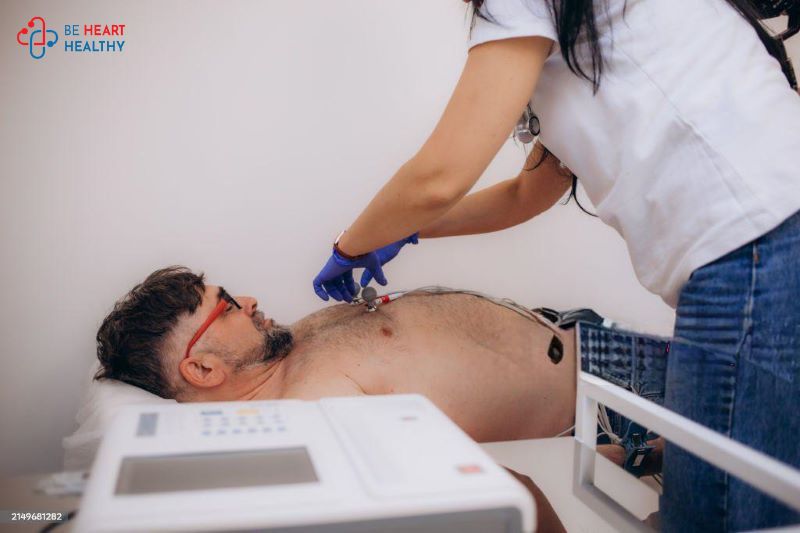How much further your heart can go before developing an irregular rhythm or losing blood flow to the heart muscle can be determined via a treadmill test (TMT) or cardiac stress test. Your doctor will benefit from understanding how your heart responds when it is stressed. On a treadmill, you will be instructed to walk as the level of effort increases rapidly.
During a stress test, your heart rate, blood pressure, and respiration are recorded as you walk on a treadmill or ride an exercise bike. You may also be given a medication that simulates the benefits of exercise.
If you exhibit cardiovascular disease or an irregular heart rhythm symptom of cardiovascular disease or an irregular heart rhythm, your doctor may advise you to undergo a stress test (arrhythmia) (1).
Indications
Your physician might prescribe a stress test for:
- Diagnose coronary artery disease.The main blood channels that carry oxygen, nutrients, and blood to your heart are called coronary arteries. The arteries get badly affected or ill, usually because of the accumulation of cholesterol and other materials such as plaques, which results in coronary artery disease.
- Diagnose heart rhythm problems (arrhythmias).Heart arrhythmias might happen whenever the electrical impulses that regulate your heart rates aren’t functioning properly. Your heart may beat excessively, gradually, or infrequently as a result of an arrhythmia.
- Guide treatment of heart disorders.An exercising stress test might help your doctor decide whether your present treatment is effective, if you have already been given a heart problem diagnosis. Your doctor can also make treatment decisions for you based on the test results.
- Check your heart before surgery.When you are healthy enough to undergo surgery, such as a heart transplant or valve replacement, your doctor may utilize a stress test (2).
Process
This examination consists of a stationary treadmill walk while your heart’s electrical activity is being tracked. The treadmill’s speed and slope rise over the course of the test. The findings demonstrate how capable your heart is to adapt to the strain of various degrees of activity.
The walking stress test lasts for approximately 45 minutes (3).
When to get a stress test
Physicians should not routinely perform exercise stress testing on patients who have no symptoms or significant risk factors for coronary artery disease (CAD). Thus, patients presenting with CAD are recommended a stress test.
Test results for stress
An exercising stress test is intended to identify the presence of fatty plaques that obstruct a blood vessel by at least 70% within one or more of the coronary arteries supplying the heart. To confirm the test findings, additional testing is frequently necessary.
Patient Instructions
On the Day of Your Test
- Do not consume food or drink for two hours before your test.
- Unless your doctor instructs you otherwise, take your regular prescriptions. Bring the original bottles of all your medications with you.
- Put on clothing and walking shoes that are appropriate for a treadmill.
After Your Test
After the walking stress test, there are no limitations. You can perform the daily routine activities (4, 5).
All the latest information regarding heart issues and concerns is available online. One of the most popular websites that ensures to take best possible care for your heart is https://behearthealthy.in/contact-us/.
It has a wide range of useful topics providing new insights regarding cardiac care, heart health and cardiologist advice to live a happy, and joyful life. We care for you, so please reach out to us on our social media page for any query: https://www.facebook.com/careforyourheart.in/ and https://twitter.com/care4urheartin
References
- Vilcant V, Zeltser R. Treadmill Stress Testing. [Updated 2022 Jul 5]. In: StatPearls [Internet]. Treasure Island (FL): StatPearls Publishing; 2022 Jan-. Available from: https://www.ncbi.nlm.nih.gov/books/NBK499903/
- Acampa W, Assante R, Zampella E. The role of treadmill exercise testing in women. J Nucl Cardiol. 2016 Oct;23(5):991-996.
- https://www.health.harvard.edu/heart-disease/cardiac-exercise-stress-testing-what-it-can-and-cannot-tell-you
- Qureshi WT, Alirhayim Z, Blaha MJ, Juraschek SP, Keteyian SJ, Brawner CA, Al-Mallah MH. Cardiorespiratory Fitness and Risk of Incident Atrial Fibrillation: Results From the Henry Ford Exercise Testing (FIT) Project. 2015 May 26;131(21):1827-34.
- Gorman MW, Feigl EO. Control of coronary blood flow during exercise. Exerc Sport Sci Rev. 2012 Jan;40(1):37-42.


